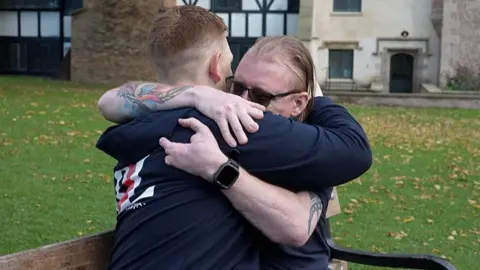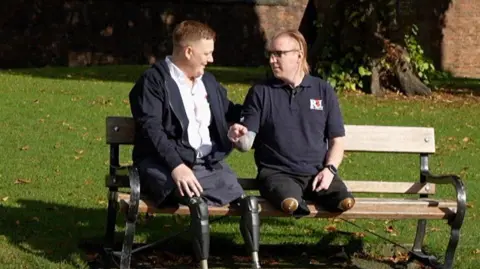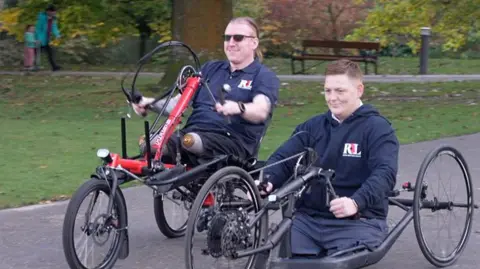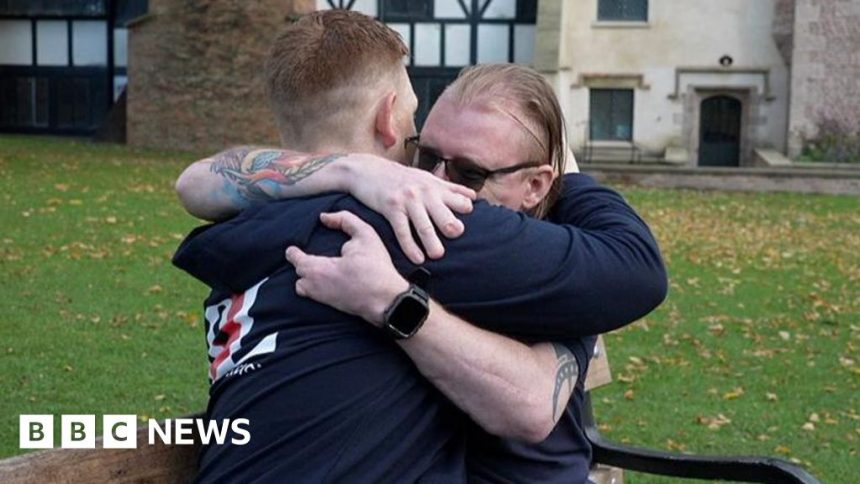Soldiers who lost both legs in Afghanistan reunite
 BBC
BBCOne morning in July 2010 changed the lives of both Antony “Coops” Cooper and David Jack Plant.
The friends from the 1st Battalion of The Duke of Lancaster’s Regiment were on patrol in Afghanistan when Coops stood on a metal strip.
“I heard a click, and I was like ‘oh no. I’m done’. I thought I was dead,” he said.
He had stood on an improvised explosive device (IED) and the explosion that followed left him without his legs, without most of his fingers, without an eye and with the most severe brain injury medics had recorded in Afghanistan.

Three minutes after he was airlifted to safety by an American black hawk helicopter, David stood on an IED.
He too lost both of his legs.
Coops remembers his helicopter turning around to collect his friend before they were both taken to Camp Bastion, and the long road to recovery began.
To mark the start of this year’s Remembrance and poppy campaign, the two men have reunited after more than a decade apart to talk about the impact that moment had on their lives and the support they were given by the Royal British Legion.
In the early days, they had supported each other through recovery.
But after 18 months of rehabilitation in Headley Court, David says he “ran away” to Spain.
‘Scooped me up’
He was suffering from post-traumatic stress disorder (PTSD) and unable to deal with everything that had happened.
He left family, friends and Coops behind. “I just sank into a really dark place. I was spiralling,” he said.
That’s when he tried to take his own life.
Within 50 minutes, two local support workers from the Royal British Legion arrived at his home in Spain.
“They literally scooped me up and took me to their place in Murcia,” he said. “I remember they gave me macaroni and cheese with chopped up bits of hot dog in it.
“I’ll never forget them. They literally saved my life. They helped me see things in a different way and I’ve been rebuilding things ever since.”

The Royal British Legion helped him move to a new home in Cumbria, making adaptions so he could live independently.
They bought him a special handcycle so that he could get out of the house and start to live again in the Cumbrian Hills.
Earlier this week, I met David in Chorley’s Astley Park to talk about his experience in Afghanistan.
After struggling to find the right words all he is able to say is, “it was hell on earth”.
“I’ve not always been able to speak to people about what happened. But the Royal British Legion have always been there at the end of the phone.”
That’s when his old friend Coops arrives to join us in the park. The two embrace and are lost for words.
“We were both there,” said Coops. “We both did the same thing. Everything we did, we more or less did it together.”
Over the past decade, however, they have grown apart.
The mental scars of war had made David retreat until he was alone and had given up hope.
“We were a lot closer in the early days, you’re right,” David says to Coops. “I drifted away.”
“You did,” replies Coops. “But I know where you are now. I won’t let you drift away again. I’ll come and find you.”
Coops remained in a coma for five weeks before being told he would never be able to walk or talk again, but he defied the medics.
The Royal British Legion funded adaptions to his home and also provided a handcycle for him to get outdoors.
“They’ve been amazing,” he said. “They have always been there for us, and I can’t thank them enough.”
Looking to the future
“I’d like to say a big thank you to all the people who support the Royal British Legion,” says David.
“I’d also like to say a big thank you to Coops. Seeing how strong he is and seeing how he has pushed through everything has really helped me.”
“I know that I’ve helped him,” replies Coops. “But he did the same for me in the early days. When it first happened, I was like, ‘why me?’. Then, ‘why am I still alive?’. We both lost a lot of friends. It’s been so hard.”
This year, the poppy campaign wants to remind people about the deep mental scars of war.
Seeing Coops and David embrace for the first time in a decade and fly around Astley Park on their handcycles, it is clear the difference the poppy appeal can make to lives broken by war.
Next year, Coops will get married and David has just found a new job.
The two men are looking to the future and say they will look to it together as friends.
They are both redheads and David jokes: “I always say, the Taliban were targeting gingers on that day.”
“Well,” replies Coops, “what I always say is they injured us, but they’ve not got us. You know? We’re still here aren’t we.”
Listen to the best of BBC Radio Lancashire on Sounds and follow BBC Lancashire on Facebook, X and Instagram. You can also send story ideas to northwest.newsonline@bbc.co.uk and via Whatsapp to 0808 100 2230.







